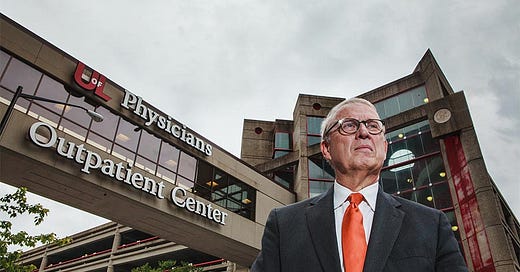
The Free Press

Child psychiatrist Allan Josephson will receive a $1.6 million settlement this week from the University of Louisville, which fired him in 2019 for criticizing the rush to use hormone therapy and gender reassignment surgery to treat gender dysphoria in children.
In an exclusive interview with The Free Press about the settlement, Josephson said when he heard the offer, he was stunned.
“I looked at my wife and I said, ‘This is amazing,’ ” Josephson told The Free Press. “We felt vindicated by the amount that we won.”
In 2019, Josephson was among the first doctors in the United States to lose his job for publicly criticizing the growing movement to quickly affirm and medically transition children with gender dysphoria. His ordeal began after he spoke out at a Heritage Foundation panel on the threat of activist clinicians. “Transgender ideology. . . is neglectful of the need for developing coping skills and problem-solving skills in children,” he said on the panel.
“The fact that even back then, that position was being held up as somehow being anti-trans is just absurd,” said Jamie Reed, who in 2023 blew the whistle to allege medical misconduct at the Washington University Transgender Center at St. Louis Children’s Hospital.
Since Josephson’s firing, a sea change has taken place regarding transgender medicine in America. President Donald Trump was elected after promising to greatly restrict gender-affirming care for minors. During the 2024 campaign season the GOP spent at least $215 million on trans-themed television ads, the most famous of which targeted Kamala Harris’s stance on transgender issues with the slogan “She’s for they/them, President Trump is for you.” On the day of his inauguration, Trump signed an executive order mandating that the federal government acknowledge “women are biologically female” and “men are biologically male.”
“I'm a doctor who pursues the truth for his patients, so when Trump says there are two sexes—male and female—I’m encouraged by that,” Josephson said.
But 2017 was a different time. By then, Josephson had served as the chair of the university’s Division of Child and Adolescent Psychiatry and Psychology for 14 years, received one of the American Psychiatric Association’s highest awards, and testified as an expert witness in several court cases on gender dysphoria. A few weeks before he spoke on the Heritage panel, Josephson visited the university’s gender clinic and met a patient with gender dysphoria. He worried clinicians were failing to treat patients’ underlying mental illness before capitulating to demands for hormones and surgery, he said.
“Of course you affirm the child and love the child, but you don't affirm a bad idea,” Josephson said on the panel.
Five days after the panel, Brian Buford, who at the time was executive director of the university’s LGBT Center, came across a blog post about the panel claiming Josephson’s comments were “anti-trans BS.” He expressed concerns about the comments in an email to Toni Ganzel, then the dean of the University's School of Medicine, who forwarded them to Josephson’s then-supervisor, Charles Woods, according to Josephson’s legal complaint. Six weeks later, Woods sent Josephson a letter telling him that “the majority of Division faculty disagrees with your approach to management of children and adolescents with gender dysphoria” and asked him to resign or be “unilaterally remove[d]” from his division chair position. Left with no choice, Josephson resigned. But it didn’t end there.
The university reduced Josephson’s “salary, retirement benefits, and academic travel funds,” according to the suit. The filing also says that after Josephson’s demotion, his colleagues began soliciting complaints about him, including scrutinizing his tax forms and noting the number of hours he was working. Three faculty members replaced Josephson after his demotion from division chair, and one expressed fear in an email to his co-chairs that the complaint campaign “makes it look like I am intentionally looking for things to target Allan [Josephson].”
As attacks on his character mounted, Josephson’s own faculty began to scour his notes on patients' clinical charts to find evidence of bad practice, he said. “That was the kind of intimidation and fear that I lived with,” Josephson said.
The University of Louisville declined to comment. Buford, Ganzel, and Woods, did not respond to Free Press requests for comment.
Finally, in 2019, the university chose not to renew Josephson’s contract, effectively terminating his position. So he partnered with the Alliance Defending Freedom, a conservative Christian legal defense fund, to sue officials at the University of Louisville, alleging that by firing him, his former employer violated his First and Fourteenth Amendment rights.
“I wanted it actually to go to court, because I thought that would be the final vindication,” Josephson said. “The personal cost was so enormous. I'm getting older, so this came at a good time, and there was a good settlement.”
Jamie Reed, the pediatric gender care whistleblower, said there’s still much to be done to protect children from life-altering surgeries they may later regret. Later this year, the Supreme Court is expected to rule on U.S. v. Skrmetti and determine whether states can ban gender-affirming surgeries for minors. For now, Josephson’s home state of Kentucky is one of 26 states with such bans.
“These kinds of one–off legal wins are hugely important, but I don’t see that we’re at a position yet where the United States has actually come to face the fact that damage is being done,” Reed said. “Half of our states are still doing this to children.”
In 2023, Jamie Reed wrote that gender-affirming care at the Washington University Transgender Center at St. Louis Children’s Hospital was “morally and medically appalling.” Read her piece, “I Thought I Was Saving Trans Kids. Now I’m Blowing the Whistle.”



